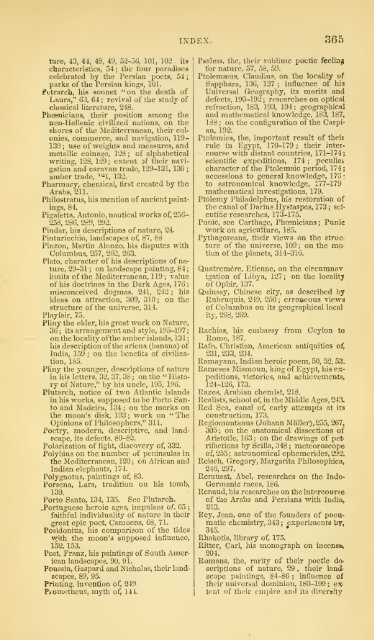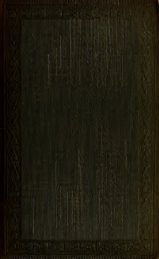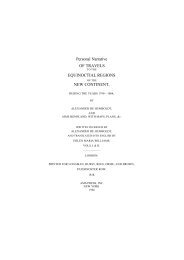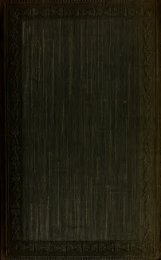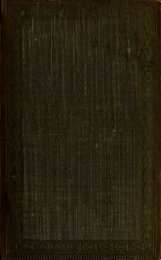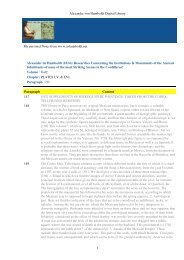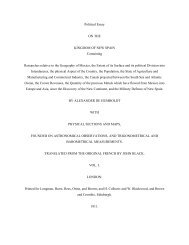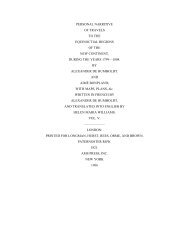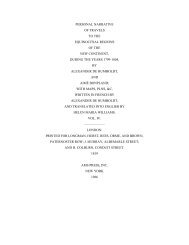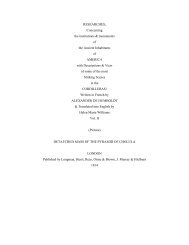See the complete document here
See the complete document here
See the complete document here
Create successful ePaper yourself
Turn your PDF publications into a flip-book with our unique Google optimized e-Paper software.
ture, 43, 44, 48, 49, 52-56, 101, 102 its<br />
..<br />
characteristics, 54 <strong>the</strong> four ; paradises<br />
celebrated by <strong>the</strong> Persian poets, 54 ;<br />
parks of <strong>the</strong> Persian kings, 101.<br />
Plato, character of his descriptions of na-<br />
ture, 29-31 on ; landscape painting, 84 ;<br />
hmits of <strong>the</strong> Mediterranean, 119; value<br />
of his doctrines in <strong>the</strong> Dark Ages, 176 ;<br />
misconceived dogmas, 241, 242 his<br />
;<br />
ideas on attraction, 309, 310; on <strong>the</strong><br />
structure of <strong>the</strong> universe, 314.<br />
Playfair, 75.<br />
Pliny <strong>the</strong> elder, his great work on Nature,<br />
36 its ; arrangement and style, 195-197;<br />
on <strong>the</strong> locality of<strong>the</strong> amber islands, 131 ;<br />
his description of <strong>the</strong> ariena (banana) of<br />
INDEX. 365<br />
Psalms, <strong>the</strong>, <strong>the</strong>ir sublime poetic feeling<br />
for nature, 57, 58, 59.<br />
Ptolemseus, Claudius, on <strong>the</strong> locality of<br />
Sapphara, 136, 137 influence of his<br />
;<br />
its merits and<br />
PtJtrareh, his sonnet " on <strong>the</strong> death of<br />
Laura," 63, 64 ; revival of <strong>the</strong> study of<br />
classical literature, 248.<br />
Phoenicians, <strong>the</strong>ir position among <strong>the</strong><br />
non-Hellenic civilized nations, on <strong>the</strong><br />
Universal Geography,<br />
defects, 190-192 researches on ;<br />
optical<br />
refraction, 183, 193, 194 ; geographical<br />
and ma<strong>the</strong>matical knowledge, 183, 187,<br />
188 ; on <strong>the</strong> configuration<br />
shores of <strong>the</strong> Mediterranean, <strong>the</strong>ir colonies,<br />
commerce, and navigation, 119use<br />
of weights and measures, and<br />
of <strong>the</strong> Caspian,<br />
192.<br />
Ptolemies, <strong>the</strong>, important result of <strong>the</strong>ii<br />
139 ;<br />
metallic coinage, 128 of ; alphabetical<br />
writing, 128, 129; extent of <strong>the</strong>ir navigation<br />
and caravan trade, 129-131, 136 ;<br />
amber trade, ^^l, 132.<br />
Pharmacy, chemical, tirst created by <strong>the</strong><br />
Arabs, 211.<br />
Philostratus, his mention of ancient paintings,<br />
84.<br />
rule in Egypt, 170-179 <strong>the</strong>ir inter-<br />
;<br />
course with distant countries, 171-174;<br />
scientific expeditions, 174 ; peculia*<br />
character of <strong>the</strong> Ptolemaic period,<br />
Pigafetta, Antonio, nautical works of, 256-<br />
258, 286, 289, 292.<br />
Pindar, his descriptions of nature, 24.<br />
Pinturicchio, landscapes of, 87, 88<br />
Pinzon, Martin Alonzo, his disputes with<br />
Columbus, 257, 262, 263,<br />
174 ;<br />
accessions to general knowledge, 176 :<br />
to astronomical knowledge, 177-179<br />
ma<strong>the</strong>matical investigations, 179.<br />
Ptolemy Philadelphus, his restoration of<br />
<strong>the</strong> canal of Darius Hystaspes, 173 sci-<br />
;<br />
entific researches, 173-175.<br />
Punic, see Carthage, Phoenicians Punic<br />
;<br />
work on agriculture, 185.<br />
Pythagoreans, <strong>the</strong>ir views on <strong>the</strong> struC'<br />
ture of <strong>the</strong> universe, 109 ; on <strong>the</strong> motion<br />
of <strong>the</strong> planets, 314-316.<br />
Quatremfire, Etienne, on <strong>the</strong> circumnav<br />
iaation of Libya, 127 ; on <strong>the</strong> locality<br />
of Ophir, 137.<br />
Quinsay, Chinese city, as described by<br />
Rubruquis, 249, 250 ; erroneous viewa<br />
of Columbus on its geographical local<br />
ity, 268, 269.<br />
Rachias, his embassy from Ceylon to<br />
Rome, 187.<br />
Rafn, Christian, American antiquities o^<br />
231, 233, 234.<br />
India, 1.59 on <strong>the</strong> benefits of civiUza-<br />
;<br />
tion, 185.<br />
Pliny <strong>the</strong> younger, descriptions of nature<br />
in his lettei-s, 32, 37, 38 on <strong>the</strong> ;<br />
" History<br />
of Nature," by his uncle, 195, Ramayana,<br />
196.<br />
Plutarch, notice of two Atlantic islands<br />
in his works, supposed to be Porto San-<br />
Indian heroic poem, 50, 52, 53,<br />
Rameses Miamoun, king of Egypt, his expeditions,<br />
victories, and aclaievements,<br />
124-126, 173.<br />
Razes, Arabian chemist, 218.<br />
Realists, school of, in <strong>the</strong> Middle Ages, 243.<br />
at its<br />
):o and Madeira, 134 on <strong>the</strong> marks on<br />
;<br />
Ihe moon's disk, 193 work on ;<br />
" The<br />
Opinions of Philosophers," 311.<br />
Poetry, modern, descriptive, and landscape,<br />
its defects, 80-82.<br />
Polarization of light, discovery of, 332.<br />
Polybius on <strong>the</strong> number of peninsulas in<br />
<strong>the</strong> Mediterranean, 120 on African and<br />
;<br />
Indian elephants, 174.<br />
Polygnotus, paintings of, 83.<br />
Porsena, Lars, tradition on his tomb,<br />
139.<br />
Porto Santo, 134, 135. <strong>See</strong> Plutarch.<br />
.Portuguese heroic ages, impulses of. 65 ;<br />
faithful individuality of nature in <strong>the</strong>ir<br />
great epic poet, Camoens, 68, 71.<br />
Posidonius, his comparison of <strong>the</strong> tides<br />
with <strong>the</strong> moon's supposed influence,<br />
152, 153.<br />
Post, Franz, his paintings of South American<br />
landscapes, 90, 91.<br />
Poussin, Gaspard and Nicholas, <strong>the</strong>ir landscapes,<br />
89, 95.<br />
Printing, invention of, 249.<br />
Piome<strong>the</strong>us, myth of, 141.<br />
Red Sea, canal of, early attempts<br />
construction, 173.<br />
Regiomontanus (Johann Muller),255, 267,<br />
305 on <strong>the</strong> anatomical dissections of<br />
;<br />
Aristotle, 163 ; on <strong>the</strong> drawings of petrifactions<br />
by Scilla, 348 ; meteoroscope<br />
of, 255; astronomical ephemerides, 292.<br />
Reisch, Gregory, Margai'ita Philosophica,<br />
246, 297.<br />
Remusat, Abel, researches on <strong>the</strong> Indo-<br />
Germanic races, 186.<br />
Renaud, his researches on <strong>the</strong> intercourse<br />
of <strong>the</strong> Arabs and Persians with ludifi,<br />
213.<br />
Eey, Jean, one of <strong>the</strong> founders of pneumatic<br />
chemistry, 343 ; experiments by,<br />
345.<br />
Rhakotis, library of, 175.<br />
Ritter, Carl, his monograph on incenaa,<br />
204.<br />
Romans, <strong>the</strong>, rarity of <strong>the</strong>ir poetic de«<br />
scriptions of nature, 29 <strong>the</strong>ir land-<br />
,<br />
scape paintings, 84-86 influence ; of<br />
<strong>the</strong>ir universal dominion, 180-199; ex<br />
tent of <strong>the</strong>ir enijiire and its diversity


